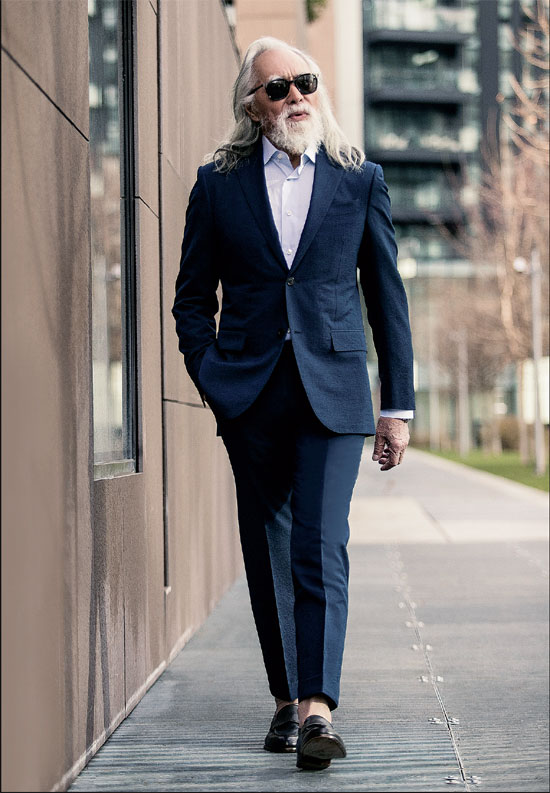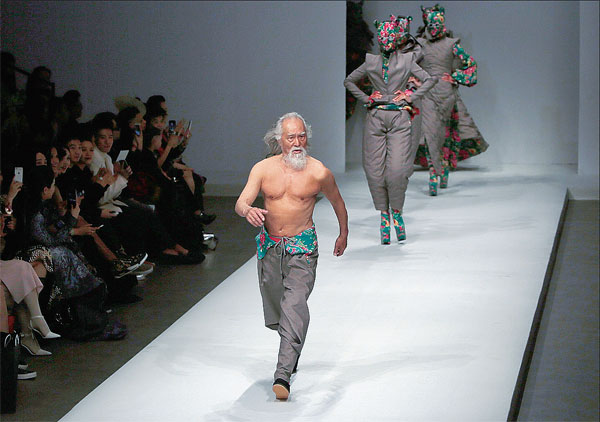Not your regular grandfather

While Wang Deshun is best-known for his impressive physique, the truly inspirational quality about this octogenarian is his tenacity in dealing with the struggles of life
Retirement for most senior citizens in China involves playing mahjong, taking care of their grandchildren and just shooting the breeze with peers at the neighborhood park.
Wang Deshun, however, has other things on his mind.
The 81-year-old says he prefers to "look for trouble" and take on more unconventional tasks that pose a sterner challenge. Despite having to juggle his time between working out at the gym, appearing at fashion shoots and acting in films and television shows, he claims that life for him these days is still too easy.
| Wang Deshun, who is dubbed "China's hottest grandpa", was recently featured in Italian brand Ermenegildo Zegna's latest campaign in China. Photos Provided to China Daily |
| Wang wowed the country in 2015 when he showed off his toned physique on the runway during China Fashion Week in Beijing. |
"Age only becomes a barrier if you think about it. There is biological age and there is another that is determined by your state of mind," he says.
Wang first shot to international fame in 2015 after he showed off his toned physique on the runway during China Fashion Week in Beijing. Nearly two years after that event, the octogenarian is still getting inundated with messages on his Sina Weibo page praising him as "inspiring" and being "the ultimate idol". Wang has more than 300,000 followers on the social networking site.
Today, people refer to him as "China's hottest grandpa", and his admirers extend to even luxury fashion houses. Italian brand Ermenegildo Zegna has featured him in its latest campaign in China called "Defining Moments". It could be considered quite an honor, considering how Oscar-winning actor Robert De Niro is part of the global campaign.
In the campaign video that was shot in Milan, Wang is flanked by actor Sunny Wang as he talks about the moment in his life that defined him.
Wang has become such a recognizable figure that his wife has banned him from accepting media interviews in an attempt to maintain their normal lives. As such, his son, who is also his agent, has been secretly arranging for interviews to be done at the gym where Wang works out daily.
A former colleague and friend of Wang described him as someone who can survive even in the depths of hell. Wang's daughter, Wang Qiu, joked that her father is akin to an imperial concubine when it comes to taking care of his body.
Wang's unusual penchant for hardship could be traced to the moment he was born.
Time of occupation
A native of Shenyang, Liaoning province, he grew up in a time when his home province was occupied by Japanese troops.
Despite his father having a job as a cook, Wang had to scour the train tracks every morning for coal dust that could be exchanged for pancakes, so as to help his parents feed his eight other siblings. He believes his mother gave birth to more than 10 children but only nine survived the harsh winters and hunger.
"Every morning when I left for the train station, I would see two people pushing a cart and picking up dead people who either froze or starved to death. They looked just like garbage collectors picking up trash from the street," he says.
"A biographer once asked me about my relationship with my mother. I told him we didn't have a relationship," he adds.
Before starting his acting career in his early 20s, Wang worked as a bus conductor and a military factory worker. However, he had a yearning to be on a stage, and he sought out this calling by signing up for free training classes offered by the local Workers' Cultural Palace, thus beginning a stage career in his hometown that spanned more than 20 years.
In 1979, after fainting several times on and off the stage, he was diagnosed with autonomic nerve disorder. He attributed it to the Stanislavski's acting system he had embraced. The doctor advised him to stop acting before the disorder developed further into more serious mental problems.
Wang decided to go with a less emotionally draining alternative-pantomime. At the age of 49, he relocated his whole family to Beijing, the only city in China where he believed pantomime would be appreciated. To prepare himself for the role, he joined the only gym in Beijing.
"It wasn't about looking good or leading a healthy lifestyle. I was doing it because you need a good body to convey the message in pantomime," says Wang.
He would labor for hours in the gym every day. He still continues to do so.
The family soon got in on the pantomime actas well. Wang's wife was the playwright and director. His daughter, a student of the Central Conservatory of Music in Beijing, was the piano obbligato. His son became the anchor man and gaffer.
While the family's performances were well received, they nevertheless struggled to make ends meet. Back in the 1980s in Beijing, where it was illegal to rent homes, Wang and his family ended up as vagabonds who had to constantly move between the homes of their friends in the capital.
"Those were tough times, but they were also some of the happiest in my life," he says.
Slowing down
Things started to look up in 1987 when he became the first Chinese actor to perform at the International Pantomime Festival in Germany. In 1989, the pantomime characters he created were included in an encyclopedia of Chinese society.
By the mid-1990s, Wang decided to slow down and do something less physically demanding. He opted to be a body artist who often took to the stage naked and covered in body paint.
Apart from working out four hours a day, he also trained himself to control his breathing so he could appear to be a living sculpture.
In 1994, the book A Hundred Years of History of China in Pictures was published. It opened with Lin Zexu, the Chinese official who fought during China's Opium War. The book ended with Wang's contributions on the stage.
Wang says that his foray into the fashion world via China Fashion Week in Beijing was not something he had planned-it was simply the result of a favor to an acquaintance who was working with Chinese designer Hu Sheguang.
Despite being catapulted to stardom, Wang is insistent that fame has not gone to his head.
If anything, he is still as frugal as before.
"Fame has not changed my life. The way I live today is no different from the past," says Wang, who today lives with his family in Beijing.
"A bowl of rice and some tofu will suffice for a meal."
xujunqian@chinadaily.com.cn
(China Daily European Weekly 06/16/2017 page22)
Today's Top News
- Hainan's special customs operations start strong
- Macao SAR holds flag-raising, reception to mark 26th anniversary of return to motherland
- China issues rules to regulate pricing practices of internet platforms
- US hits over 70 IS-linked targets in Syria in massive retaliatory strikes
- Coffee needs cooperation, not confrontation
- Technological innovation brings cultural heritage alive
































